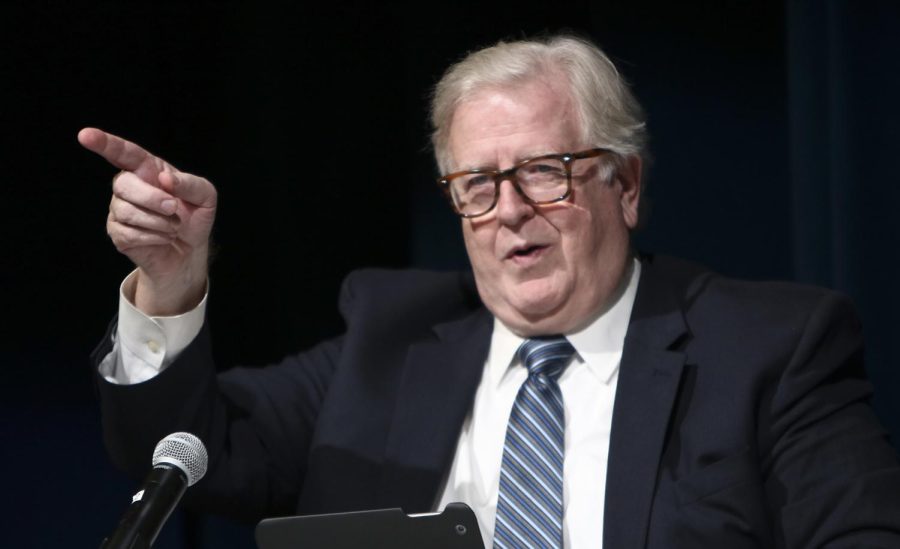‘Do you know your five freedoms?’ event focuses on First Amendment
Gene Policinski, the chief operating officer of the Newseum Institute and First Amendment Center, gestures toward the audience during his joint presentation on the First Amendment with David Hudson Jr. (not pictured) in the Kiva Tuesday, Oct. 3, 2017
The First Amendment and the thorough examinations it has undergone lately were the key points at the “Do You Know Your Five Freedoms?” conversation in the Kiva Tuesday.
The May 4 Visitors Center, the May 4 Task Force, the College of the Arts and the College of Communication and Information hosted the event.
Featured panelists at the conversation included David Hudson Jr. from the Vanderbilt University School of Law and Ombudsman of the First Amendment Center, and Gene Policinski, the chief operating officer of the Newseum Institute and First Amendment Center.
From debates on peaceful protests to controversy behind athletes kneeling during the national anthem, the First Amendment has been thrust into the national spotlight. These occurrences have ignited a newfound confusion as to what the First Amendment actually stands for and protects.
“It doesn’t protect everything,” Hudson said. “Even though it says Congress shall make no law, there are narrow areas where the Constitution doesn’t protect.”
These narrow areas, Policinski mentioned, include athletes kneeling during the national anthem, and “the physical act of kneeling is not protected.”
Policinski discussed how the NFL is a private company and the First Amendment is designed to apply to the government and protection from government action. While individuals certainly have a right to not recite the Pledge of Allegiance or stand for the national anthem, these acts of protest by NFL players are not actually protected.
Unearthing what is protected is by the First Amendment is often blurred. Policinski said according to an annual Newseum survey, “33 percent of people couldn’t name a single freedom” guaranteed by the First Amendment.
Ali Zahorec, a senior zoology major, came to the event hoping to learn more about the rights in the Constitution, and said they are relevant to today’s political culture.
“We have the right to express ourselves freely,” Zahorec said, describing what the First Amendment means to her. “You have more outlets for that expression. You can voice your discontents with what’s going on.”
One way of expressing discontents protected under the First Amendment is the right to protest.
The Westboro Baptist Church has found infamy in its strong condemnation of homosexuality, as well as consistently exercising their First Amendment right to protest at military funerals.
The Supreme Court has previously ruled in the church’s favor, citing their use of hate speech and funeral picketing is actually protected under the First Amendment.
Policinski looks at their expression in a realistic way in regard to exercising the First Amendment.
“We need to hear things that disgust us to be better prepared against them,” Policinski said.
Hudson viewed the church’s interpretation of free speech as a matter of perspective as well, and said, “Offensiveness and obscenity is in the eye of the beholder.”
Quoting the opinion from Justice John Marshall Harlan II from the Cohen v. California case, he added, “One man’s vulgarity is another’s lyric.”
Policinski and Hudson agreed while the actions of the Westboro Baptist Church are cruel and ill-intentioned, by limiting their right to free speech, the First Amendment itself becomes limited and subject to maneuverability.
As Ombudsman of the First Amendment Center, Hudson advocates for knowledge regarding the five freedoms allowed to citizens of the United States. He said he feels strongly about individuals actually understanding their rights.
“The remedy to be applied,” Hudson said, “is more speech without enforced silence.”
Lauren Garczynski is the College of Communication and Information reporter. Contact her at [email protected].



